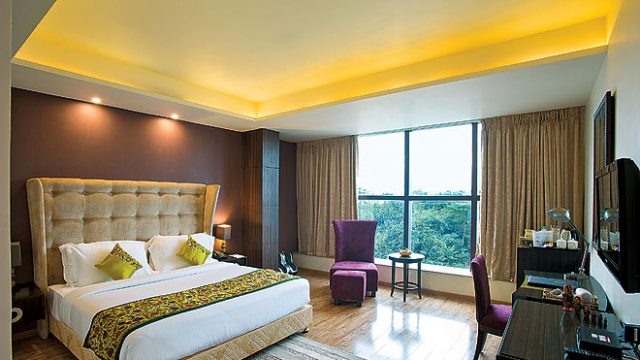Atithi devo bhavah, indeed. It used to be traditional in India to wash a visitor’s feet, to signify this and do him obeisance. A refreshing and much-needed gesture, of course, in the days when hermetically sealed, vacuum-cleaned rooms were not the norm. The Pipal Tree hotel, Kolkata has a modern equivalent — an in-room foot massager that staff warmly usher you to on arrival, while offering a welcome drink and very ‘neighbourhood bakery (but better)’ biscuits.
A fascinating little water feature and an assortment of lanterns and oil lamps sit before the reception area, with a cushion-strewn bench standing by to lend the weary traveller a pause. Just off it, the door in a glass curtain wall automatically slides open to the cheerful café, called Ira, with cheery red benches that are reminiscent of college canteens. The nostalgia is reinforced by retro comic strips (Bantul the Great! Handa and Bhonda!) and black-and-white photographs. The piped music is determinedly 80s–90s. Even the confectioner’s case has the bright pink pastries, cream puffs and flaky triangles of pattice to complete the blast from the past.
On the other side of the lobby, the stairwell has a few armchairs, a newspaper rack, and the tiniest elevator. Squeeze in, though, and you can see good use has been made of the hallway space freed up on each floor. We pass, in order, the lobby fronting the bar and speciality restaurant Tamara, with prettily plated modern Indian cuisine, and a lounge bar called Raya; a drawing room with those deliciously relaxing planter’s chairs and a small but keenly collected library; and finally on our floor a billiards table.
It has all the ‘international hospitality’ mod cons. However, the spirit of place is layered over the fluffy white beds, marble and glass bathrooms and carpeted corridors. The dark saturated accent walls are less jewel tone, and more Indian truck art. A bamboo ladder lashed with jute rope holds towel — and a single thoughtful gamchha — in an otherwise modern bathroom. The upholstered bed has a broad strip of embroidered silk and matching cushions thrown on — featuring intricate kantha-stitched patterns, the ur embroidery of Bengal. A bullock cart, minus the cattle power, stands in one lobby. Every room has old-fashioned toys, from the vernacular version of Matrushkas to swaying clay figurines and wooden owls for good fortune. Hurricane-style street lamps and a bit of iron grille are welded into a chandelier in front of Tamara.
It’s all a welcome cushion from which to approach the city of contrasts outside the huge glass windows on the city-view side. Swanky mall (City Centre II) on the horizon. Humble thatched hutments and children washing at a public handpump just across. Squawking rickshaws, rumbling lorries, overstuffed buses and yellow-topped taxis scatter the crush of toy box cars below. Above, flights roar down to the landing strip or race up into the clouds, silenced by the double glazing. The TV never got turned on. We ate our nostalgically newspaper-parcelled but supersized fish fry on the window sill that evening — by the way, the room service menu does justice to the city’s reputation for generous cheap eats, all portions being pretty much family-sized.
Tearing yourself away from the street theatre to do lunch downstairs is a good idea though. Compared to the light-hearted and deftly controlled kitsch everywhere else, Tamara is high drama. Shamiana-style fabric gathered in billows across the ceiling, makeshift clouds from which bulb-lit brass bowls emerge like so many suns. Red and green silken drapes meet and lockstep like a Mohun Bagan jersey. Stone table tops and stoneware provide a quiet foil to white crockery and fancifully plated bekti piccata in lime-raisin-wine sauce, robibarer mutton kosha, yellow methi dal, rosemary-anointed lamb chops, Hakka noodles and Sichuan fried rice, spicy pork ribs — all the usual suspects of a middle-class Kolkata bhuribhoj, only better and beautifully presented.
Just like the breakfast buffet. A gargantuan effort of surprisingly good quality, with juices, eggs, dosas, muffins, hummus, labneh, sausages, mushrooms, fresh fruits, homemade preserves, poha and porridge and poori bhaji and cereals, and excellent coffee and tea — worth leaving the airport for if you have a long transit.
Like the Bodhi tree of legend, Pipal Tree does a top notch job of providing shelter, rest and refreshment, and extras like entertainment, amusement and edification, if not ultimate enlightenment.
The information
Where: AS/464, Hatiara, Major Arterial Road, New Town; 10 minutes from airport
Accommodation: 35 rooms: 23 standard, 11 deluxe, 1 suite
Tariff: Rs 4,500 (standard), Rs 5,500 (deluxe), Rs 7,500 (suite); all rates on double occupancy, including breakfast and wi-fi, taxes extra
Contact: 033-30606060, pipaltreehotel.com




